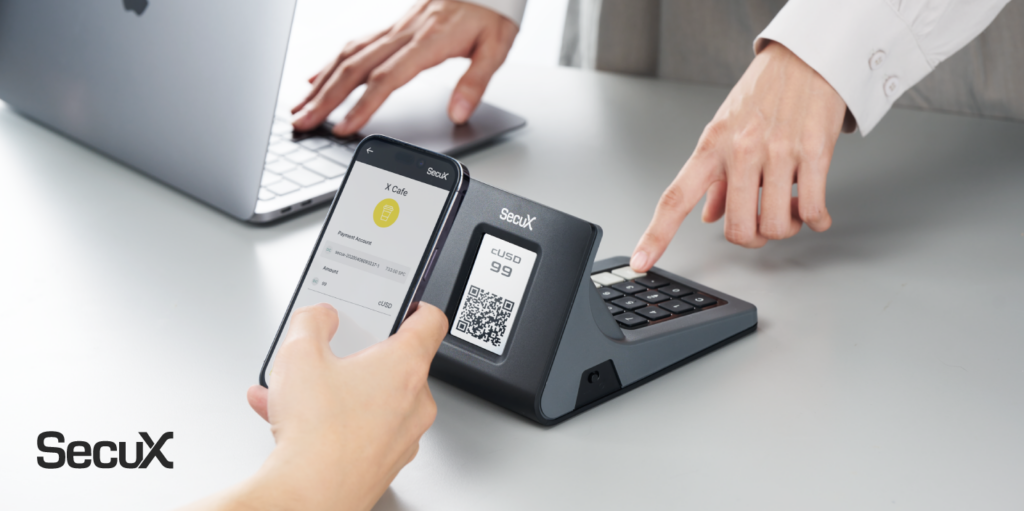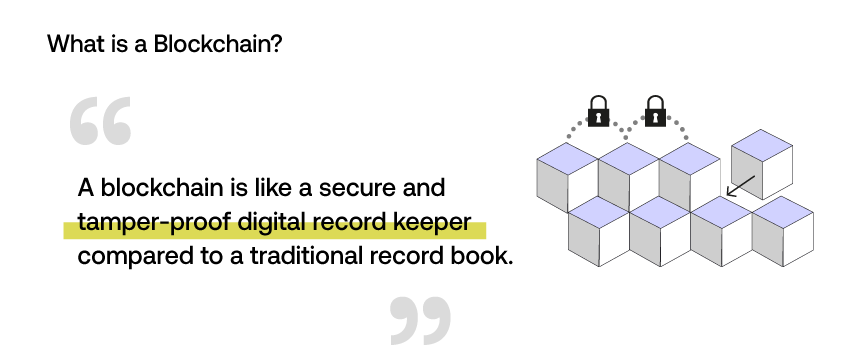
Disclaimer: The information provided in this article is for educational purposes only and should not be considered as financial advice.
The world is on the cusp of a digital revolution and blockchain technology is spearheading the movement. What used to be a niche understood only by tech pros has now become more commonplace.
In fact, blockchain technology is starting to make its mark on traditional finance with payment systems at the forefront. Let’s take a deep dive into what blockchains are and how they can impact financial transactions.
What is a Blockchain?

A blockchain is like a digital record keeper, or ledger if you will. Living up to its name, a blockchain is quite literally a chain of blocks linked together with transaction records stored within each individual block. What makes blockchain technology unlike any other is its security and immutability.
Another very important aspect about blockchains is decentralization. Instead of being governed by a central entity, blockchains are decentralized with dispersed control that ensures transparency for transaction verifications and security.
Unique Traits of Blockchain Technology

- Security – Each block is independent and secure. If one is hacked, the chain retains its integrity. Once a transaction is recorded on the block, it becomes unchangeable, which protects against fraud.
- Transparency – Your identity is kept private, but your transactions are not. Because all blockchain transactions are visible to participants in the network, which also reduces harmful activities.
- Decentralization – A blockchain is maintained by many blocks in a distributed network, which makes it a decentralized ledger technology. Each participant within the network has a copy of the entire chain to verify transaction independently so no sole entity has total control.
- Immutability – Once something has been added to the blockchain, it cannot be changed or removed.
- Direct transactions – There is no need for intermediaries within a blockchain. Blockchain technology enables peer-to-peer transactions to increase speed and reduce fees.
- Smart contracts – Smart contracts are an indispensable part of blockchain technology. These are programmable contracts that automatically carry out the terms once certain conditions are met.
How Blockchain Tech Impacts Payments
Blockchain technology brings with it many innovative functions such as stablecoins, more specifically, USDC. USDC maintains its constant value by being pegged to the US dollar. This means that its value increase and decrease follows USD, which is meant to provide stability within the crypto market.
The TRON blockchain has its own stablecoin known as USDC TRC20, which allows users to store and transact the stablecoin across TRON’s ecosystem. The TRC20 serves a similar function for TRON as ERC20 does for Ethereum, which helps with the operation of smart contracts, wallets, and applications.
Another breakthrough on the digital payment landscape is with Korean’s Shinhan Bank’s recent proof-of-concept (PoC) trial for stablecoin remittances on Hedera. Using blockchain, the bank was able to make instant payments across different currencies, which could speed up and reduce the cost of global transactions.
The method they used also works with any stablecoin issuers using Ethereum’ Virtual Machine (EVM) system. This technology isn’t just faster and cheaper, it could also help people in underprivileged communities make financial transactions at much lower costs. This shows how blockchain can make international payments faster, cheaper, and more available to everyone.
Blockchain and Cross-Border Payments
A primary aim of blockchains is to aid cross-border payments. The goal is for users to send money to other countries in a faster, cheaper and safer way.
The security is heightened with the transparent digital ledger that records every transaction publicly, and it removes the need for middlemen which can result in high fees and network congestion.
It also allows us to track money transfers in real time and is very inclusive, providing an affordable way for people in all communities to send and receive money. This is how blockchain is revolutionizing cross-border payments.
Blockchain Payment Use Cases
As said, blockchain plays a pivotal role in how we make payments in the future. It will transform our payment systems to provide secure and private cross-border transactions and locally as well. International payments will be made easier without the need to rely solely on traditional financial institutions.
Traditional payment methods are not regulated like that on the blockchain, with smart contracts to cut out the middlemen and make transactions much more efficient.
Here are three examples of blockchain-based payments being used in the real world.
- De Beers: The diamond giant uses blockchain tech to trace where their diamonds come from. They have a system called Tracr that allows customers to follow a diamond’s journey from the mine to the store. This helps to prove that the diamonds were responsibly sourced.
- IBM: IBM uses blockchain solutions to keep track of goods in the supply chain. They’ve developed a platform that allows businesses to make sure their products are genuine and sourced in a responsible way.
- Starbucks: The premier global coffeehouse chain uses blockchain for its “Bean to Cup” project. Customers can use this initiative to see their coffee’s journey from the farm to their cup. This helps ensure the coffee beans are sourced ethically and promotes sustainable farming.
- Crypto.com Pay – Consumers can shop 150+ brands, earn rewards, send crypto to friends for free, and even buy rare NFTs on the platform/app.
- Hedera DROPP – This is a micro-payment platform for HBAR, USD and USDC.
- Coinbase Pay – Coinbase Pay enables purchasing and transferring of certain cryptocurrencies directly from self-custody wallets and decentralized apps (dapps) like MetaMask. Not all Coinbase-listed cryptos might be accessible via Coinbase Pay on external apps.
Pros and Cons of Blockchain Tech for Payments
It seems like blockchain technology offers only amazing developments for our payment systems, but are there any cons?
Pros of Blockchain Tech for Payments:
- Security: Blockchain technology is designed to be secure and tamper-proof because it’s decentralized and uses cryptographic techniques to minimize fraud.
- Transparency: Every transaction on a blockchain is visible to all participants, which provides transparency and trust.
- Affordability: By eliminating middlemen, blockchains can reduce transaction costs associated with cross-border payments, banking fees, and other financial transactions.
- Speed: Payment procedures are sped up, even for cross-border transfers.
- Financial Inclusion: Blockchain can simulate a global financial system and offer financial services to those who are in developing countries.
Cons of Blockchain Tech for Payments:
- Scalability Issues: As the number of transactions increases the blockchain will too, which could lead to scalability issues and slower transaction times.
- Regulatory Challenges: The decentralized nature of blockchains can make it difficult to regulate, which opens up opportunities for misuse and fraud.
- Lack of Adoption: Blockchain is still a relatively new technology, and many businesses and individuals may not fully trust it yet.
- Price Volatility: Cryptocurrencies are prone to drastic price fluctuations, which can introduce risk into transactions, especially when you’re looking to off-ramp (convert digital assets into traditional currencies).
Conclusion
Blockchain is revolutionizing payment methods by offering security, speed, and cost-efficiency. Despite challenges like regulation and volatility, it’s already making transactions more transparent and accessible. As this technology evolves, we can expect even more improvements to how we handle money in the digital age.
Related Articles
Crypto Hash – What Is It and What Does It Do?
Multi-Signature Wallets – Are They Right for You?
How to Store NFTs – Doing It Safely and Securely
Sources
Legality of cryptocurrency by country or territory
How Blockchain Is Changing Finance
Blockchain technology is revolutionizing payments

0 comments